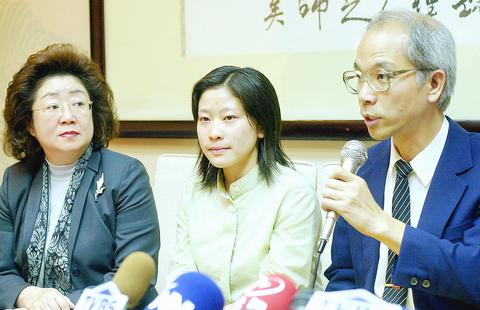Government officials yesterday threw their support behind students who had their computers seized last week for allegedly downloading illegal MP3 music files.
Minister of Education Ovid Tzeng (

PHOTO: CHEN CHENG-CHANG, TAIPEI TIMES
A police search of the dorm rooms of 14 students at National Chengkung University (
"Any action of prosecutors and the police should be taken with prudence and kept within limits with respect to academic freedom and the autonomy of universities," Tzeng said.
"I will absolutely fight for the rights of students regarding the incident of the police searching the Chengkung student dorm," Tzeng added. "I will ask attorneys to help the students settle any legal disputes stemming from this incident."
Tzeng said the ministry hopes the public will have access to and enjoy sharing information on the Web as long as copyrights are respected.
"Current regulations are hardly sufficient, considering what is needed in these `E-times.' We need to cope with disputes regarding the use of Internet resources with more patience and intelligence," the minister said.
The International Federation of the Phonographic Industry (IFPI), an umbrella group representing the record industry in Taiwan, also seems to have softened its attitude toward the students as more and more advocates of students' rights have spoken up in recent days.
"Only when we know whether the downloaded files are the property of our member record labels will we decide whether we'll take any action," Robin Lee (李瑞斌), IFPI secretary-general, said yesterday.
Vice Minister of Education Fan Sun-lu (
Minister of Justice Chen Ding-nan (
Chen also said that the ministry's policy was to give priority to serious "black gold" crimes in its crackdown on intellectual property rights violations, saying he never asked prosecutors to target university students in the investigation.
According to ministry guidelines issued in November, when prosecutors plan to conduct search and seizure raids at "special places," they have to report to their divisional head and prosecutor general. The latter will then report to his or her superior prosecutors' office.
The "special places" listed in the guidelines include government departments, secret military sites, the Legislative Yuan, county and city councils, institutions of higher education and offices of the media.
Also See Editorial Inside

CHAOS: Iranians took to the streets playing celebratory music after reports of Khamenei’s death on Saturday, while mourners also gathered in Tehran yesterday Iranian Supreme Leader Ayatollah Ali Khamenei was killed in a major attack on Iran launched by Israel and the US, throwing the future of the Islamic republic into doubt and raising the risk of regional instability. Iranian state television and the state-run IRNA news agency announced the 86-year-old’s death early yesterday. US President Donald Trump said it gave Iranians their “greatest chance” to “take back” their country. The announcements came after a joint US and Israeli aerial bombardment that targeted Iranian military and governmental sites. Trump said the “heavy and pinpoint bombing” would continue through the week or as long

TRUST: The KMT said it respected the US’ timing and considerations, and hoped it would continue to honor its commitments to helping Taiwan bolster its defenses and deterrence US President Donald Trump is delaying a multibillion-dollar arms sale to Taiwan to ensure his visit to Beijing is successful, a New York Times report said. The weapons sales package has stalled in the US Department of State, the report said, citing US officials it did not identify. The White House has told agencies not to push forward ahead of Trump’s meeting with Chinese President Xi Jinping (習近平), it said. The two last month held a phone call to discuss trade and geopolitical flashpoints ahead of the summit. Xi raised the Taiwan issue and urged the US to handle arms sales to

BIG SPENDERS: Foreign investors bought the most Taiwan equities since 2005, signaling confidence that an AI boom would continue to benefit chipmakers Taiwan Semiconductor Manufacturing Co’s (TSMC, 台積電) market capitalization swelled to US$2 trillion for the first time following a 4.25 percent rally in its American depositary receipts (ADR) overnight, putting the world’s biggest contract chipmaker sixth on the list of the world’s biggest companies by market capitalization, just behind Amazon.com Inc. The site CompaniesMarketcap.com ranked TSMC ahead of Saudi Aramco and Meta Platforms Inc. The Taiwanese company’s ADRs on Tuesday surged to US$385.75 on the New York Stock Exchange, as strong demand for artificial intelligence (AI) applications led to chip supply constraints and boost revenue growth to record-breaking levels. Each TSMC ADR represents

State-run CPC Corp, Taiwan (CPC, 台灣中油) yesterday said that it had confirmed on Saturday night with its liquefied natural gas (LNG) and crude oil suppliers that shipments are proceeding as scheduled and that domestic supplies remain unaffected. The CPC yesterday announced the gasoline and diesel prices will rise by NT$0.2 and NT$0.4 per liter, respectively, starting Monday, citing Middle East tensions and blizzards in the eastern United States. CPC also iterated it has been reducing the proportion of crude oil imports from the Middle East and diversifying its supply sources in the past few years in response to geopolitical risks, expanding